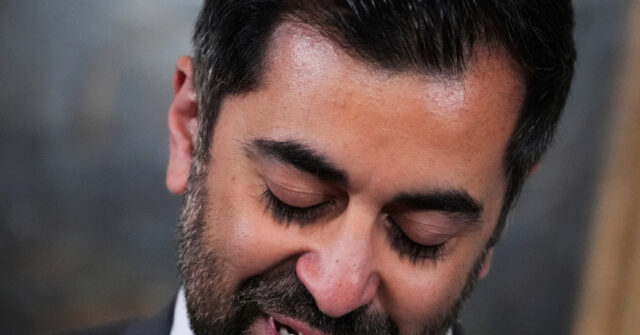
Humza Yousaf announced his resignation as Scottish First Minister on Monday morning before facing being forcibly removed.
The post Scottish First Minister Humza Yousaf Resigns Less Than One Month After Introduction of Hate Speech Censorship Law appeared first on Breitbart.

In a spectacular act of political self-immolation, far-left censorship czar Humza Yousaf announced his resignation as Scottish First Minister on Monday morning before facing the prospect of being forcibly removed by a vote of no-confidence.
Infamously censorious, race-baiting Scottish First Minister Humza Yousaf has announced he is stepping down, a victim of his own political machinations after he summarily dismissed his coalition partners in an apparent bid to avoid them doing the same to him, first.
Humza Yousaf said he is resigning as the leader of the Scottish government, the 25-year-old devolved assembly in North Britain which rules on certain domestic policy within the United Kingdom, bringing to a near-close 13 months of hard-left law-making. Yousaf was installed just over a year ago after his predecessor, Nicola Sturgeon, left office in another cloud of scandal, which is still set to bedevil the party, with Sturgeon’s husband being charged with allegedly embezzling party funds earlier this month.
Among the Yousaf administration’s best-known policies have been the failed climate targets, the abandonment of which this month precipitated the government crisis, and his hate speech law, one of the toughest in the Western world.
Engaging in the exercise of legacy building at Bute House, his official residence in the heart of Edinburgh, Humza attempted to assert his version of events by stating he believed in blowing up the governing agreement that kept his party in power with the support of the radical Green Party “was the right thing” to do. Yet, he reflected, “in ending the Bute House agreement in the manner that I did, I clearly underestimated the level of hurt and upset that caused”.
Scots Tories Call Vote of No Confidence in Left Nationalist Leader Humza Yousaf After Green Defenestration https://t.co/vZ71n3chtg
— Breitbart London (@BreitbartLondon) April 25, 2024
Rather than continuing to support the government “in a less formal arrangement” after having their ministers sacked and the agreement torn up — apparently without warning or prior consultation — the Greens accused Humza’s left-nationalists the SNP of betrayal. Without their votes, he would have likely been unable to survive a vote of no confidence called this week that may have brought down his government. In resigning now before that vote, Humza may have been sacrificed by the SNP in the hope of taking the wind out of the sails of the anti-government vote, meaning the administration could possibly limp on.
Asserting his resignation as a selfless and principled act, Yousaf said: “While a route through this week’s motion of no confidence was absolutely possible, I am not willing to trade my values and principles or do deals with whoever simply for retaining power… I have concluded that repairing our relationship across the political divide can only be done with someone else at the helm.”
Scotland can not look forward to a new leader immediately, though, with Yousaf saying he intended to stay at the helm as a caretaker until the SNP nominates a new leader. Some of the leading candidates to replace Yousaf at the helm of the SNP — a pro-independence party which calls for Scotland to leave the UK and join the European Union — include SNP Westminster leader Stephen Flynn and former SNP finance secretary Kate Forbes, who ran against Yousaf in last year’s leadership contest but fell short following backlash within the leftist party against her traditional Catholic convictions.
As befits his identity politics-led time in power, the speech from the UK’s first Muslim leader also focussed on one of his pet obsessions: race. Known with concern long before he got the top job because of a rant he delivered in Scotland’s Parliament where he exhaustively decried how many white people there are in Scottish public life, Yousaf ended his tenure with more of the same.
He said: “People who looked like me were not in positions of political influence, let alone leading governments when I was younger. We now live in a UK that has a British Hindu Prime Minister, a Muslim Mayor of London, a black Welsh First Minister, and for a little while longer a Scott Asian First Minister. So for those who decry that multiculturalism has failed across the UK, I would suggest the evidence is quite to the contrary and that is something we should all celebrate.”
My comments from yday’s debate directed to my fellow Govt colleagues
Is easy to point out Opposition failures, we have to accept that we’ve not made enough progress for our minority communities
I take this as a personal failure & recommit myself to a fairer Scotland for all pic.twitter.com/yskVDS9TGu
— Humza Yousaf (@HumzaYousaf) June 11, 2020
Yousaf, who previously served as justice minister in the Nicola Sturgeon administration, has long been a controversial figure in Scotland, with many often criticising him for his apparent incompetence and others taking aim at the Pakistani heritage politician over his penchant for engaging in race-based woke politics. This culminated in an infamous 2020 rant on the floor of the Scottish Parliament amid the Black Lives Matter protests and riots following the death of George Floyd in America.
In his address to the parliament, Yousaf malinged the fact that the “most senior positions in Scotland are filled almost exclusively by people who are white”, despite the country having a 96 per cent white population.
“Take my portfolio, for example. The Lord President: white. The Lord Justice Clerk: white. Every High Court judge: white. The Lord Advocate: white. The Solicitor-General: white. The chief constable [of Police Scotland]: white. Every deputy chief constable: white. Every assistant chief constable: white. The head of the Law Society: white. The head of the Faculty of Advocates: white. Every prison governor: white,” the woke politician exclaimed, adding: “That is not good enough.”
The rant came back to bite Yousaf in recent days as members of the Scottish reported the speech en masse to Police Scotland as a potential instance of hate speech under the new Hate Crime and Public Order (Scotland) Act, which Yousaf, himself, championed.
Embarrassingly for the first minister, the reports against him were so numerous — reportedly outnumbering those made against Harry Potter author J.K. Rowling — that Police Scotland was said to have given a script to officers on how to explain why Yousaf’s apparently anti-white comments did not violate the law.
‘Huge Mistake’ — Scottish Conservatives Push for Repeal of New Hate Speech Lawhttps://t.co/yVqL49XoDs
— Breitbart London (@BreitbartLondon) April 15, 2024
The introduction of the new speech restrictions at the start of the month saw political chaos break out in the country as police struggled to keep up with thousands of reports, the vast majority of which were deemed to be illegitimate. Under the law, those found to have engaged in “stirring up hatred” against a protected group of people, such as the elderly, the disabled, racial minorities, or members of the so-called LGBTQ community, face up to seven years in prison. Controversially, the law reportedly covers comments made in the privacy of one’s home and does not take into account whether the comments were intended to “stir up hate” but merely if they could be seen as doing so.
The speech restrictions have so far not gone down well with the public, with just one in five Scotts supporting the measure, as opposed to 45 per cent who believe that the bill should be overturned, undercutting the claims from Yousaf that opposition to the restrictions was merely a creation of “right-wing actors” like J.K. Rowling and podcaster Joe Rogan. At the same time, Yousaf’s personal approval rating plummeted, with a survey finding that less than three in ten supporters of his own Scottish National Party believing that the first minister was doing a good job.
Nevertheless, Yousaf attempted to claim that his 13 months in power represented a victory for wokism, saying on Monday: “I also hope that as a country we can be really proud of the strides that we have made to tackle inequality, prejudice, and discrimination. But let’s also acknowledge that far too often in our country hatred continues to rear its ugly head. In a world where every issue seems to descend into a toxic culture war, it is often the most marginalised in our society who bear the brunt.”
“As politicians of all political parties we are afforded, we are privileged to have a platform — each and every one of us must resist the temptation of populism at the expense of minorities, particularly in a general election year. I have often said as a minority myself my minorities don’t exist in a vacuum, they’re only protected because the rights of everyone are protected.”
Attempting to cling to some political relevance, Yousaf also declared that he intends to remain in the Scottish Parliament where he said he will “continue to champion the voices and rights of those who are not often heard. Be that at home or indeed overseas, such as those suffering the most horrific humanitarian catastrophe in Gaza as the world watches on.”
Woke Fail: Leftist Scottish Leader Receives More Hate Speech Complaints than J.K. Rowling, as Police Swamped with Reportshttps://t.co/K8hzNfPSFD
— Breitbart London (@BreitbartLondon) April 3, 2024







